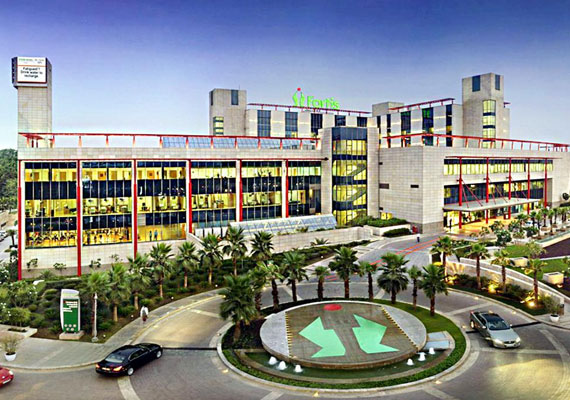
Chronic Myeloid Leukemia (CML) treatment in india
01 Dec, 2023
 Healthtrip Team
Healthtrip TeamWelcome to our comprehensive guide on Chronic Myeloid Leukemia (CML) treatment in India, a beacon of hope for patients across the globe. India, with its cutting-edge medical facilities, skilled healthcare professionals, and cost-effective treatment plans, has emerged as a leading destination for medical tourism, particularly in the field of oncology. In this blog, we will delve into the innovative treatments available for CML in India, highlighting why it is an excellent choice for patients seeking quality care and new beginnings.
Transform Your Beauty, Boost Your Confidence
Find the right cosmetic procedure for your needs.

We specialize in a wide range of cosmetic procedures

Understanding Chronic Myeloid Leukemia (CML)
Chronic Myeloid Leukemia is a type of cancer that affects the bone marrow and blood. It occurs due to a genetic mutation in the bone marrow stem cells, leading to the uncontrolled growth of abnormal white blood cells. Recognizing the early signs of CML, which may include fatigue, night sweats, and unexplained weight loss, is crucial for timely treatment.
- Cutting-Edge Medical Technology: India's hospitals are equipped with the latest medical technology, providing patients with advanced diagnostic and treatment options essential for effective CML management.
- World-Class Oncologists and Hematologists: Indian medical experts are globally recognized, many with international training. Their deep knowledge of CML ensures personalized and effective treatment plans.
- Cost-Effective Treatment: India offers world-class CML treatment at much lower costs compared to Western countries, without compromising quality.
- Holistic and Integrative Care: The Indian healthcare approach often combines modern medicine with traditional practices, offering a holistic treatment experience. This is beneficial in managing CML treatment side effects and improving overall well-being.
Advanced Treatment Options for Chronic Myeloid Leukemia (CML) in India
India's healthcare system has made significant strides in treating Chronic Myeloid Leukemia (CML), offering a range of advanced treatment options. These treatments are not only at par with global standards but are also more accessible and affordable. Let's delve deeper into these advanced treatment options available in India.
1. Targeted Therapy
Targeted therapy, particularly the use of Tyrosine Kinase Inhibitors (TKIs), is the cornerstone of CML treatment in India. These drugs, such as Imatinib, Dasatinib, and Nilotinib, have revolutionized CML treatment by specifically targeting the BCR-ABL tyrosine kinase, an abnormal protein produced by the cancerous cells.
- Imatinib (Gleevec): This was the first TKI introduced and has dramatically improved the prognosis for CML patients. It's typically the first line of treatment.
- Second-Generation TKIs: Dasatinib and Nilotinib offer options for patients who cannot tolerate Imatinib or when Imatinib is not effective. These drugs are more potent and can target a broader range of BCR-ABL mutations.
- Third-Generation TKIs: Ponatinib is used for patients with T315I mutation or those who are resistant to other TKIs.
Indian medical centers are adept at monitoring the efficacy of these drugs and managing any side effects, ensuring personalized care for each patient.
Most popular procedures in
Total Hip Replacemen
Upto 80% off
90% Rated
Satisfactory

Total Hip Replacemen
Upto 80% off
90% Rated
Satisfactory

Breast Cancer Surger
Upto 80% off
90% Rated
Satisfactory

Total Knee Replaceme
Upto 80% off
90% Rated
Satisfactory

Total Knee Replaceme
Upto 80% off
90% Rated
Satisfactory

2. Bone Marrow/Stem Cell Transplant
For patients in the advanced phase of CML or those who do not respond to TKIs, a bone marrow transplant (BMT) or stem cell transplant (SCT) may be recommended. India has several specialized centers for BMT, known for their high success rates and expert medical teams.
- Allogeneic Transplant: This is the most common type of transplant for CML, where stem cells are received from a compatible donor.
- Autologous Transplant: In rare cases, a patient's own stem cells may be used.
Post-transplant care, which is crucial for the success of the procedure, is a strong point of Indian healthcare services, ensuring comprehensive monitoring and support.
3. Clinical Trials and Research
India is actively involved in international clinical trials for new CML treatments. This opens doors for patients to access innovative therapies that are in the development stage. Participation in these trials is supported by thorough ethical guidelines and regulatory frameworks.
4. Interferon Therapy
Although less common now due to the effectiveness of TKIs, interferon therapy is still used in certain cases. It involves stimulating the immune system to attack cancer cells and can be used in combination with other treatments.
5. Supportive Treatments
Supportive care in India also includes treatments to manage symptoms and side effects of CML and its treatment. This includes:
- Growth Factors: To stimulate blood cell production.
- Medications: To manage side effects like nausea, pain, and infections.
- Holistic Approaches: Including yoga, meditation, and Ayurveda, which are integrated for overall well-being.
6. Genetic Counseling and Monitoring
Advanced genetic testing and monitoring are integral parts of CML treatment in India. Regular monitoring through quantitative PCR helps in assessing the response to treatment and detecting any possible resistance to drugs.
7. Personalized Medicine
The concept of personalized medicine is gaining ground in India, with treatments being tailored based on the genetic profile of the patient and the specific characteristics of the leukemia.
The advanced treatment options for CML in India are a testament to the country's commitment to providing high-quality healthcare. With continuous advancements and a patient-centric approach, India is not just a destination for affordable treatment but also for some of the most sophisticated CML therapies available globally. Patients opting for CML treatment in India can expect a blend of technical excellence, innovative treatments, and compassionate care.
- Located in Sector 38, Gurgaon, Haryana, India, is a renowned healthcare facility
- The hospital spans a massive 2.1 million sq. ft. area.
- It offers 1,600+ beds for patient care.
- The campus includes facilities for over 22 super-specialties.
- Medanta features a unique design where each floor is dedicated to a specific medical specialization, functioning like independent hospitals within a larger hospital. This ensures focused and specialized care for each department.
- The hospital emphasizes a collaborative approach to treatment. Complex cases are often reviewed by a cross-function, cross-specialization committee, such as the Tumor Board, which helps determine the most effective treatment plans.
- Besides medical treatments, Medanta also provides amenities like a guest house for the convenience of patients and their families.
- Location: Sector - 44, Opposite HUDA City Centre, Gurgaon, Haryana - 122002, India.
- Type: Multi-super specialty, quaternary care hospital.
- Faculty: Enjoys an enviable international faculty.
- Clinicians: Comprises reputed clinicians, including super-sub-specialists and specialty nurses.
- Technology: Equipped with cutting-edge medical technology.
- Capacity: Spacious 11-acre campus with 1000 beds.
- Quality and Safety: Has undergone a thorough on-site review of the quality and safety of care.
- International Standards: Committed to continuously meeting rigorous international standards.
- Specialties: Unmatched in the field of Neurosciences, Oncology, Renal Sciences, Orthopedics, Cardiac Sciences, and Obstetrics And Gynecology.
- Flagship Hospital: Fortis Memorial Research Institute is a flagship hospital of Fortis Healthcare, one of the top healthcare providers in the country.

- Location: Situated in Gurgaon, India
- Size: Located on a sprawling 9-acre campus.
- Bed Capacity: Over 400 beds.
- Accreditations: The first JCI (Joint Commission International) and NABH (National Accreditation Board for Hospitals & Healthcare Providers) accredited hospital in Gurgaon.
- Advanced Infrastructure: Designed as one of the most advanced hospitals in India.
- Medical Expertise: Provides a wide range of advanced medical and surgical interventions.
- Comprehensive Services: Offers a comprehensive mix of inpatient and outpatient services.
- Technology: Equipped with modern technology, enhancing healthcare standards.
- Research-Oriented Practices: Medical practices and procedures are research-oriented and benchmarked against global standards.
- Recognized Excellence: Received the 'Asia Pacific Hand Hygiene Excellence Award' by WHO in 2011.
- Specialties: Excelling in various medical fields, including cardiology, CTVS (Cardiothoracic and Vascular Surgery), neurology, neurosurgery, neuro-interventional, oncology, surgical oncology, orthopedics, spine surgery, organ transplants, general surgery, emergency care, and women & child care.
Best doctors for Chronic Myeloid Leukemia (CML) in India
- Blood Disorders and Bone Marrow Transplant
- Consults at: Fortis Memorial Research Institute, Gurgaon, and Fortis Hospital, Noida
- Achievements: Pioneered stem cell transplant in multiple sclerosis in India.
- Experience: Over 15 years of medical expertise.
- Transplants: Successfully completed 400+ transplants.
- Vision: Established an integrated center of excellence in Hematology and Stem Cell Transplantation at Fortis Memorial Research Institute.
- Recognition: Renowned hematologist in Delhi and Gurgaon.
- Specialties: Benign Hematology, Hemato-oncology, Pediatric Hemato-oncology, Transplants (including haploidentical), Hematopathology, Molecular Hematology.
2. Dr. Vinod Raina

- Position: Head of Department & Director of Medical Oncology and Hematology
- Hospital: Fortis Memorial Research Institute, Gurgaon
- Experience: Over 40 years
- Main Speciality: Medical Oncology
- Other Specializations: Hematology, Concurrent Bio-Radiotherapy, Paediatric Chemotherapy & Palliative Bio-Chemotherapy
- Specialty Interests: Breast Cancer, Lung Cancer, GI Malignancies, Genitourinary Cancer, Gynaecological Malignancies, Lymphoma, Bone Marrow, and Stem Cell Transplant
- Former Professor and Head of Medical Oncology at AIIMS
- Approximately 400 bone marrow/stem cell transplants performed personally
- Principal Investigator of around 50 research projects
- Co-Founder of INDOX network
- Mentor to numerous residents and DM students, many in leading positions in India and abroad
- Executive Director at FMRI (Fortis Memorial Research Institute)
- Chairperson of Oncosciences at Fortis Healthcare
India stands as a pillar of hope and healing for patients battling Chronic Myeloid Leukemia. With its blend of advanced medical technology, skilled professionals, and holistic care, India not only offers a chance for recovery but also a journey towards a rejuvenated life. If you or your loved one is considering CML treatment, India's doors are open, offering a path to not just surviving, but thriving.
Wellness Treatment
Give yourself the time to relax
Lowest Prices Guaranteed!

Lowest Prices Guaranteed!

 \
\




